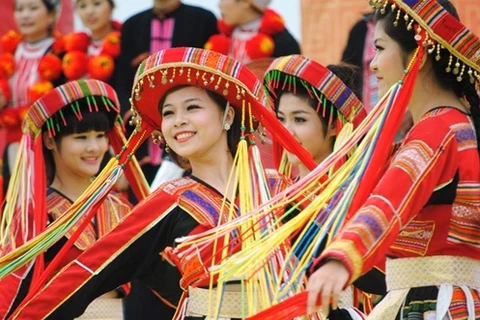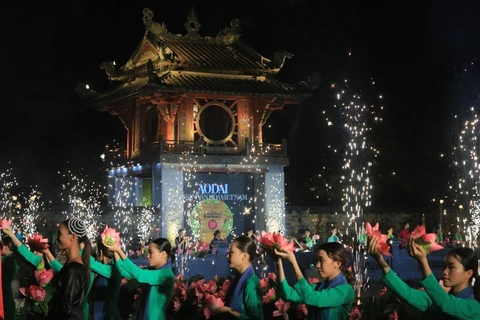Hanoi (VNA) –The National Strategy on the Development of Cultural Industries is an effort by Vietnam to fulfill the 2005 UNESCO Convention on the Protection and Promotion of the Diversity of Cultural Expressions, said UNESCO chief representative in Vietnam Christian Manhart during a symposium held in Hanoi on September 12.
The event was held to review the five-year implementation of the strategy for the 2016-2021 period
Vietnam will succeed if it can properly mobilise cultural resources, knowledge, and modern technology to create diverse and attractive cultural products and services, he added.
According to him, this strategy combines socio-economic development with cultural development. It focuses on the economic values of cultural-artistic creativity, and pays attention to the creativity diversity of individuals, collectives and communities.
The development of cultural industries is one of the key factors for economic growth, contributing to GDP development through job creation and opening of new markets.
In fact, Hanoi is the first city in Vietnam to join the UNESCO Creative Cities Network. Since then, Hanoi has led the development of creative and cultural industries, actively using this network for international exchanges and cooperation.
He expressed his delight that other cities in Vietnam are in the process of applying for membership of the network. He believed that this international platform will greatly contribute to the development of creative and cultural industries in the country.
Asso. Prof Nguyen Thi Thu Phuong, Director of the Vietnam National Institute of Cultural and Arts Studies (VICAS), said cultural industries both directly bring socio-economic benefits and contribute to creating a driving force for Vietnam's development amidglobal integration and delivery of international commitments such as the UNESCO Convention.
Cultural industries are strategic assets in Vietnam’s foreign policy and international cooperation and help strengthen the uniqueness of the country. Cultural industries play a key role in promoting cultural identity and modernising the nation, serve as an effective tool for economic growth and innovation, and make culture an important component of international trade and competitiveness.
In the current trend of globalisation and global integration, cultural exchange and cultural competition in the world, the cultural industry is creating a new cultural power for each country, Phuong said.
Deputy Minister of Culture, Sports and Tourism Doan Van Viet said the event gives a chance look back on the continuous efforts of the Ministry of Culture, Sports and Tourism together with researchers, businesses, individuals and organisations in the process of building cultural industries over the past five years.
He expected that the symposium would mark a new turning point in the development of Vietnam's cultural industries when they are properly invested and become a driving force and goal of sustainable development.
The National Strategy on the Development of Vietnamese Cultural Industries by 2020, with a vision to 2030, was approved by the Prime Minister on September 8, 2016, with a goal of cultural industries’ occupation of around 3% to the nation’s gross domestic product (GDP) by 2020.
In 2018, cultural industries contributed 7.46 billion USD, accounting for 3.61% of GDP, and generating jobs for over 3 million people, making up 6.1% of the country’s total number of labourers.
Hanoi aims to earn increasing revenue from cultural business, which are expected to contribute around 10% of the city’s Gross Regional Domestic Products (GRDP) by 2045, according to a plan newly introduced by the municipal People’s Committee.
The city plans to raise the cultural industry’s contribution to GRDP to 5% by 2025 and 8% by 2030.
From now to 2025, Hanoi will focus its efforts on boosting a number of cultural industries in line with local advantages and potential, including cultural tourism, handicraft, performing arts, cinema, designing, culinary, entertainment software and games, advertising, architecture, photography and exhibition, fashion, television and radio and publishing./.


























